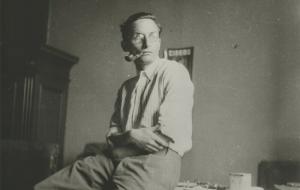John Dewey: biography of this pioneer of functionalism
John Dewey's contributions were very relevant to different fields related to the human sciences. Although he was trained as a philosopher, Dewey was also influential in psychology, pedagogy, logic and even in American politics, since he openly defended very progressive positions.
In this article we will review the life and work of John Dewey. We will place particular emphasis on his contributions to philosophy and psychology within the frameworks of pragmatism and functionalism, respectively.
- Related article: "History of Psychology: main authors and theories"
Biography of John Dewey
American John Dewey was born in 1859 in Burlington, in the state of Vermont. There he went to university to study Philosophy. Evolutionary theories had a key influence on the development of his thought; Throughout his career he would focus on the interaction between humans and his environment, inspired by Darwin's idea of natural selection.
After graduating in 1879 Dewey worked for two years as a primary and secondary school teacher, but eventually chose to pursue philosophy. He received his doctorate from Johns Hopkins University in Baltimore; For the next 10 years he was a professor of philosophy at the University of Michigan and in 1894 he joined the Chicago University, which had just been founded.
By then Dewey had already written his first two books: Psychology (1887) and Leibniz's New Essays Concerning the Human Understanding (1888). In these works synthesized Hegelian idealism and experimental science applied to human behavior and thought.
Later evolution of his thought
Later Dewey's philosophy evolved to approach North American pragmatism, which was beginning to develop at that time. He applied his thesis to the educational context by publishing the book School and society (1899) and the foundation of a pedagogical laboratory, although he ended up resigning his position as director.
For the rest of his life Dewey worked as a Professor of Philosophy at Columbia University in New York City. There he established relationships with many philosophers and his thinking was enriched thanks to contributions from very different perspectives.
His focus of interest continued to be pedagogy, always linked to philosophy, logic and politics; in fact, he was an activist committed to causes such as the defense of the rights of immigrants, the unionization of teachers, women's suffrage and participatory democracy in general. John Dewey died in 1952, at the age of 92.
Philosophical proposal: pragmatism
Pragmatism is a philosophical current that emerged in the United States in the 1870s. This tradition defends that thought does not have as its main function the representation of reality but its prediction and action on it.
It is considered that Charles Sanders Peirce was the founder of Pragmatism. Other relevant philosophers who followed him were William James, Chauncey Wright, George Herbert Mead and John Dewey himself. However, this author described himself as an instrumentalist and consequentialist as well as a pragmatist.
Dewey was of the opinion that philosophers took as true constructs that had been created only with the aim of helping to conceptualize reality, while ignoring the mental functions that constitute thought itself. For him, as for the rest of functionalists, this should be the focus of attention of philosophy.
From this perspective, thought is understood as an active construction that takes place from human interaction with the environment, so it is constantly updated. This is opposed to the classical view of ideas as passive results of observing the world.
Thus, according to pragmatism, human concepts do not constitute a reflection of reality nor is there an absolute truth, as affirmed by the rationalist and formalist philosophers. The practical utility of a "truth" or the consequences of an act are what gives them meaning, and therefore philosophy must focus on the objective and not on concepts.
- Related article: "How are Psychology and Philosophy alike?"
Functionalist psychology
Functionalism is a theoretical orientation of psychology that analyzes behavior and cognition from the point of view of active adaptation to the environment. Logically there is a strong relationship between functionalist psychology and pragmatism in philosophy. At a more general level, functionalism was a philosophy that also influenced sociology and anthropology.
William James founded functionalism, although he did not consider himself part of this current nor did he agree with the division of scientists into schools of thought. Other authors who made relevant contributions in this framework, in addition to Dewey, were George Herbert Mead, James McKeen Cattell and Edward Thorndike.
Functionalism emerged as a reaction to Edward Tichtener's structuralism; James or Dewey rejected his introspective methodology, but continued to emphasize conscious experience. Later behaviorism criticized functionalist positions because they were not based on controlled experiments and therefore had no predictive capacity.
Functionalist psychology was inspired by the evolutionary ideas of Darwin and his followers. Today functionalism continues to live mainly in evolutionary psychology, which analyzes the development of the human mind from a phylogenetic point of view.
- Related article: "The theory of biological evolution"

